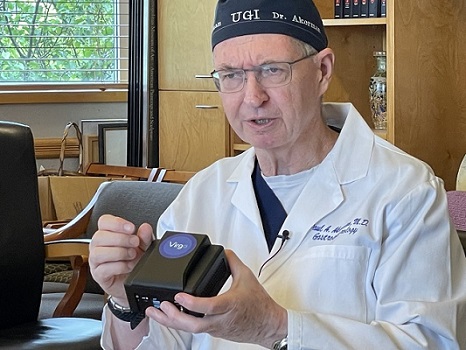Dr. Paul Akerman, a gastroenterologist at University Gastroenterology LLC, is among the physicians at the practice to use the Virgo platform, a system that works hand in hand with endoscopic procedures to help identify good candidates for clinical trials. Akerman explains the system and what its use at University Gastroenterology will mean for patients.
PBN: What is the Virgo platform designed to do, and how does it work?
AKERMAN: The Virgo platform combines artificial intelligence machine learning and storage in the cloud, allowing us in real time to have computer-assisted visualization of the endoscopy procedure, as well as instant recall of any procedures done in the past. In the past, we were not able to record endoscopy procedures due to storage issues. Cloud storage has solved this problem.
While the procedure is being performed, AI is continually watching the procedure and evaluating the mucosal lining of the GI [gastrointestinal] tract. This allows us to identify abnormal pathology in real time, including the identification of polyps.
Specifically for research protocols, the artificial intelligence can identify, categorize and evaluate any potential patients for clinical studies.
PBN: What does the use of the platform mean for University Gastroenterology patients?
AKERMAN: Initially, Virgo will help us better identify candidates for clinical research trials, which means more of our patients will have increased access to promising new drugs and devices. But that’s just one benefit.
Incorporating the Virgo platform into our everyday workflow at all University Gastroenterology locations is a significant step toward combining cutting-edge technology with the skill and expertise of our providers and will enable us to provide even more effective care to all of our patients.
For example, the Virgo drastically reduces the need for repeat endoscopies because all scopes will be automatically recorded and saved on the cloud. If we refer a patient for surgery, the surgeon will have access to all of the videos from that initial endoscopy. In addition, access to that video enables us to more easily collaborate with other colleagues – whether in the practice or around the globe – on complex cases, which greatly improves case documentation and care team coordination.
PBN: How often do you recommend inflammatory bowel disease patients for participation in clinical trials, and what criteria do you use to make those recommendations?
AKERMAN: Our patients are regularly considered for clinical studies. But matching up the right patient with the right study can prove to be challenging. The exclusion and inclusion criteria pharmaceutical companies establish for entering studies are usually quite precise. This is necessary so that the study is able to clearly determine the efficacy of the treatment.
Virgo leverages artificial intelligence and endoscopic video data to more easily identify patients who meet the criteria. Computer vision analyzes the endoscopic video data and identifies patients who meet the eligibility criteria for specific clinical trials within Virgo’s pharmaceutical partner network. The early results are extremely encouraging – Virgo as a whole is seeing a [fivefold] increase in patient referrals and a [fourfold] increase in patient randomization.
Being part of this large clinical study program will give us access to an increased number of drugs and devices that have the potential to improve the care of our patients.
PBN: Will the Virgo platform be used to screen potential participants for clinical trials of treatments of gastrointestinal diseases beyond IBD?
AKERMAN: The Virgo platform will initially be used primarily for critical studies in the area of inflammatory bowel disease. The platform is highly versatile and will be used in the future for all clinical studies involved in the GI tract at University Gastroenterology.
Virgo is currently working closely with its pharmaceutical partners to develop additional solutions on the Virgo platform that help them further decentralize and accelerate their clinical trials in IBD and a number of other therapeutic areas that involve endoscopy.
PBN: With the use of the platform, is University Gastroenterology joining a network of providers that are screening for eligible clinical trial participants?
AKERMAN: University Gastroenterology is one of a number of large very clinically active centers that offer patients cutting-edge therapies and treatments. Those providers themselves aren’t part of a network, per se. However, by using the Virgo platform, University Gastroenterology patients will be considered for clinical trials within Virgo’s pharmaceutical partner network.
Elizabeth Graham is a PBN contributing writer.











